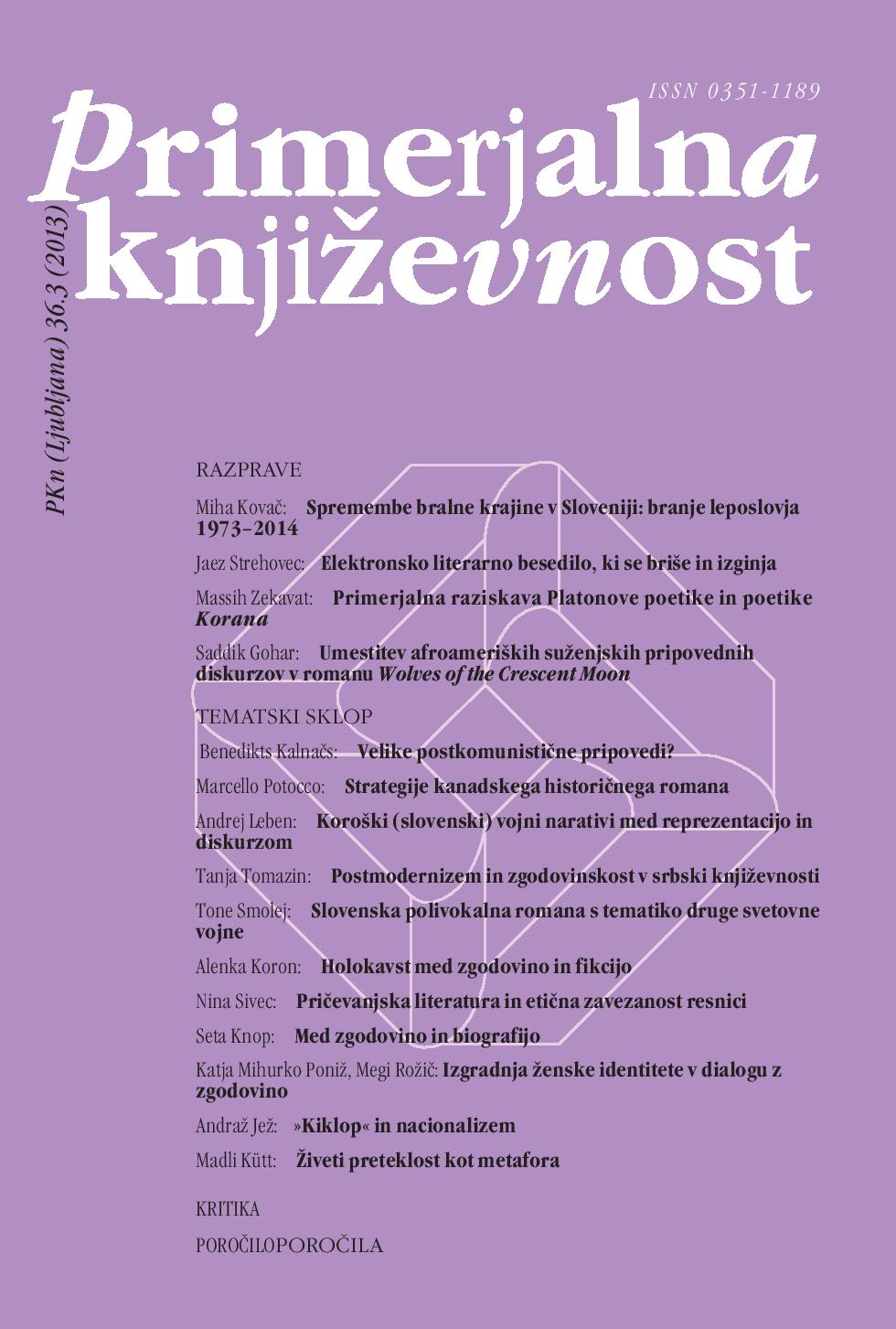Testimonial Literature and Ethical Obligation to Truth: Relationships Between Testimony, Falsification and Heterobiography
Keywords:
literature and ethics, German literature, Müller, Herta, testimonial literature, heterobiographyAbstract
This article deals with characteristics that define testimonial literature and a special position this type of literature has amongst other literary genres. Although the expression testimonial comes from the field of law, its function in literature is, of course, not used in the same way. Telling the truth or provable historical reality in testimonial novels is still inevitably linked to the process of fictionalization, it still has to achieve its own autonomy as a work of fiction and its own aesthetic effect. – However, the truth still remains one of the most important characteristics of this kind of work because the most important characteristic, differentia specifica, of testimonial literature is the ethical obligation of the author to write the truth – his own and also of those who did not survive the traumatic experience. The other important characteristic that is crucial for the reader to recognize the work he is reading as testimonial is identifying the author, the narrator and one of the characters (not necessary the main one) of that particular book as the same person (“testimonial act”). This is most easily achieved by the same name – the one on the cover of the book and the one used in the contents of the same book and with the use of the first person narrative (as a sign of integration of narrator as a character in events/plot). The other very important way of the author communicating to the reader is through a kind of a commentary – this is the part of the novel where the author distances himself from the literalization and in doing so warns the reader that what he is reading is actually historically accurate. – However, testimonial literature also includes works where an author works together with a survivor and writes his or her (the survivor’s) story that is not his own. Herta Müller’s The Hunger Angel (Atemschaukel) is an example of such literature. Because this novel shares some of the characteristics of testimonial literature and also heterobiography the term “heterotestimony” seems to suit it best.References
Bjelčevič, Aleksander. »Cilj posvečuje sredstva: argumentativne zmote v primeru Smolnikar«. Sodobna slovenska književnost 1980–2010 (2010): 19–25.
Boldrini, Lucia. Autobiographies of Others: Historical Subjects and Literary Fiction. New York: Routledge, 2012.
– – –. »Heterobiografija, hipokritika in etika avtorske odgovornosti«. Primerjalna književnost 32. Posebna številka (2009): 85–95.
Davis, Todd F., Womack, Kenneth (ur.). Mapping the Ethical Turn: A Reader in Ethics, Culture and Literary Theory. Charlotesville: University Press of Virginia, 2001.
Ingarden, Roman. Literarna umetnina. Prev. Frane Jerman. Ljubljana: Studia Humanitatis, 1990.
Irwin, William (ur.). The Death and Ressurection of the Author? London: Greenwood Press, 2002.
Iser, Wolfgang. Bralno dejanje. Teorija estetskega učinka. Prev. Alfred Leskovec. Ljubljana: Studia Humanitatis, 2001.
Juvan, Marko. »Fikcija in zakoni. (Komentar k primeru Pikalo)«. Primerjalna književnost 26.1 (2003): 1–20.
– – –. Literarna veda v rekonstrukciji. Ljubljana: Literarno-umetniško društvo Literatura, 2006. (Zbirka Novi pristopi).
Lejeune, Philippe. On Autobiography. Prev. Katherine Leary. Minneapolis: University of Minnesota Press, 1989.
Levi, Primo. Ali je to človek; Premirje. Prev. Sergij Šlenc. Ljubljana: Cankarjeva Založba, 2004.
– – –. Potopljeni in rešeni. Prev. Irena Prosenc Šegula. Ljubljana: Studia Humanitatis, 2003.
Malouf, David. An Imaginary Life. London: Vintage Books, 1999.
– – –. Umišljeno življenje. Prev. Breda Biščak. Ljubljana: Cankarjeva založba, 2009.
Matajc, Vanesa. »Medbesedilna razmerja med ustno zgodovino in zgodovino v pričevanju«. Acta Histriae 19.1/2 (2011): 301–318.
Müller, Herta. Atemschaukel. München: Hanser, 2009.
– – –. Zaziban dih. Prev. Mojca Kranjc. Ljubljana: Študentska založba, 2010.
Pahor, Boris. Nekropola. Ljubljana: Mladinska knjiga, 2008.
Pravo: leksikon. Ur. Bronislava Aubelj. Avtorji geslovnika in besedil: Ljubo Bavcon [et al.]. Ljubljana: Cankarjeva založba, 2003.
Rožac Darovec, Vida. »Metodološki in etični problemi ustne zgodovine«. Acta Histriae 14.2 (2006): 447–467.
Schuchalter, Jerry. Poetry and Truth: Variations on Holocaust Testimony. Bern: Peter Lang, 2009.
Žgank, Jasmina. Poskus opredelitve pričevanjske književnosti ob besedilih francoskih in slovenskih pisateljev-deportirancev. Diplomsko delo. Ljubljana: Filozofska fakulteta, 2008.


